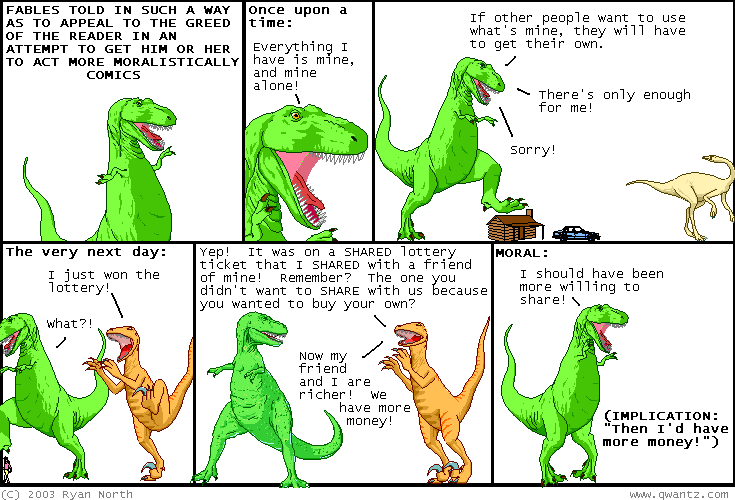Dinosaur Comics offers the best demonstration. Try mousing over the comic too. (Man, I'm such a sucker for these webcomics...)

It's common for writers to want to teach some sort of moral lesson (TVTropes has a list of these). How do you do it? Well one way is by having a character obey or disobey that lesson, and then punish or reward them based on
The problem is that even though the fictional character was rewarded for doing good and punished for doing bad, how do we know a real character would get the same results? If it were a true story, we could at least point to the ending as empirical evidence (though, as an anecdote, it would suffer severely from selection bias). But since it's fiction, the evidence is fictional. As moving and inspirational the story might be, it is a poor way to prove anything about the real world.
On the other hand, perhaps the story makes a very convincing case that it could be real. For example, take the thought experiments performed by Albert Einstein. He created fictional stories of things moving near the speed of light, and from this was able to prove deep truths about space-time. What's the difference between Einstein's thought experiments and regular old science fiction novels?
I think that in general, the difference is only by degree. Some stories are simply more believable than others. For example, I find it highly improbable that Utahraptor will win the lottery, and much more believable that the boy who cried wolf would be ignored after lying so much. But you can't just say it's believable. You do not want your arguments to even resemble, "I believe it, therefore it's true." (What if it's only believable because you hope it's true?) You have to give reasoned arguments for why the outcome of the story would also be the outcome of a real situation. And if you already had reasoned arguments, what need is there for a story, except as a tool to generate interest and understanding?
On second thought, that sounds pretty useful...
Moral: Be cautious when deriving real life lessons from fiction. Instead, we should value fictional works for what they are--stories that can be provocative, inspirational, and entertaining.









0 comments:
Post a Comment